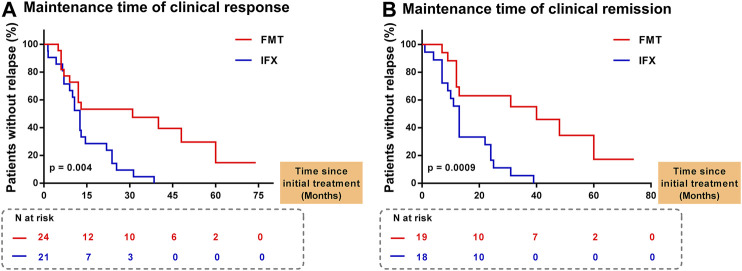FIGURE 3.
Evolution without clinical relapse (A) Time to lose response in patients who had achieved clinical response. At 1, 15, 30, 45, 60, and 75 months after FMT, 24, 12, 10, 6, 2 and 0 patients maintaining clinical response were followed, respectively. At 1, 15, 30, 45, 60, and 75 months after IFX, 21, 7, 3, 0, 0 and 0 patients maintaining clinical response were followed, respectively. Rates of clinical relapse were significantly higher in IFX treatment stage than those in FMT treatment stage (log-rank test p = 0.004) (B) Time to lose response in patients who had achieved clinical response. At 1, 20, 40, 60 and 80 months after FMT, 19, 10, 7, 2 and 0 patients maintaining clinical remission were followed, respectively. At 1, 20, 40, 60 and 80 months after IFX, 18, 10, 0, 0 and 0 patients maintaining clinical remission were followed, respectively. Rates of clinical relapse were significantly higher in IFX treatment stage than those in FMT treatment stage (log-rank test p = 0.0009). FMT, fecal microbiota transplantation; IFX, infliximab; N, number of patients.

